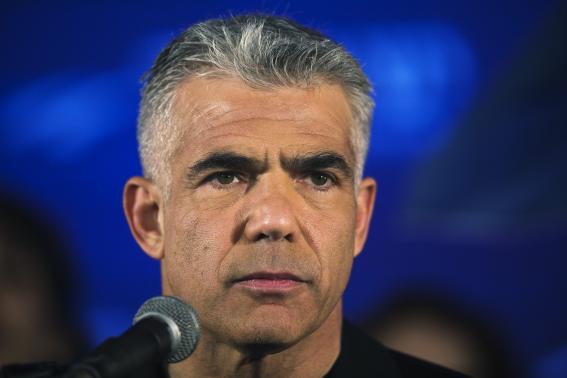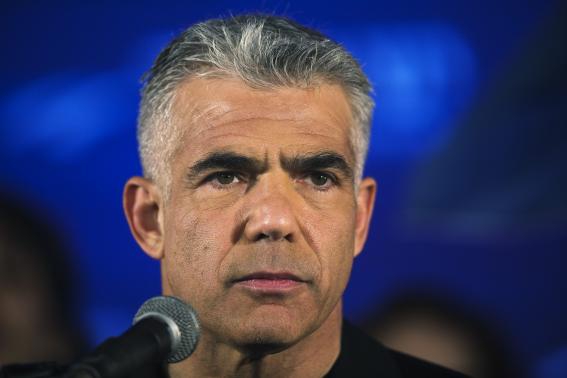 Yair Lapid, head of Yesh Atid party, speaks to supporters during a conference in Holon near Tel Aviv March 12, 2015.
Yair Lapid, head of Yesh Atid party, speaks to supporters during a conference in Holon near Tel Aviv March 12, 2015.CREDIT: REUTERS/AMIR COHEN[/caption]
(Reuters) - The era of Prime Minister Benjamin Netanyahu is ending, with Israeli voters clearly more concerned about economic and social issues than about security or fears over Iran, a leading election candidate said on Monday.
The centre-left opposition is poised for a surprise victory over Netanyahu's right-wing Likud in one of Israel's most nail-biting elections in years, according to the last polls. Nearly six million Israelis are eligible to vote in Tuesday's election.
Yair Lapid, a telegenic former news anchor and TV host, leads the centrist, secular Yesh Atid party ("There's a Future"), which emerged out of the cost-of-living protests that sweptIsrael�in 2011.
The party came a surprise second in the last election in 2013 and is again set for an influential showing.
"The majority of Israelis want change," Lapid, 51, told Reuters in between campaign events.
"The Netanyahu era is coming to an end. That's not because security issues don't matter but because social and economic issues are dominating the agenda," he said in an interview.
"Netanyahu has missed his moment. You can't blame him - it's never easy to know when the moment of your era passes. But for him it has passed."
Lapid was finance minister in Netanyahu's outgoing government but the two seldom saw eye-to-eye, and it was the dismissal of Lapid and Justice Minister Tzipi Livni in December that precipitated these elections.
When Netanyahu called the vote he looked set to secure a fourth term in office, which would have put him on track to become the country's longest-serving prime minister.
But his focus on the threat from Iran's nuclear program and Islamist militants in Gaza and the region left voters uninspired, with even long-running Likud supporters saying they had heard such rhetoric before.
Netanyahu's speech to the U.S. Congress, criticized by many at home and in Washington, also appears to have marked something of a turning point. Before the speech, he was broadly ahead in opinion polls but his numbers have trailed off since, with his anti-Iran message failing to gain traction.
Final polls published on Friday nearly all showed the Zionist Union, the centre-left opposition alliance led by Isaac Herzog and Livni, holding a four-seat advantage going into the vote.
"KINGMAKER"
No party has ever won an outright majority in�Israel, meaning coalition-building is critical. It is also a tricky and unpredictable affair, with a vast array of allegiances possible among the 11 parties expected to end up in parliament.
Even if Netanyahu and Likud win fewer seats than the centre-left, they could still end up forming a coalition, especially as there are more like-minded parties on the right and far-right than there are on the center or left.
That puts kingmakers like Lapid in a commanding position. Going into the 2013 election, Yesh Atid was predicted to win 13 seats and ended up getting 19. Lapid reckons a repeat of that is possible this time around and some analysts agree.
His party is known for having a strong grassroots organization, and activists say Israel's polling methods, which largely rely on fixed line calls rather than mobile ones, fail to capture the party's support among young urbanites.
"Around 15 percent of voters make up their minds on the day and we're pretty good at tapping into those people," said Lapid, who is fond of wearing t-shirts with a suit jacket and jeans. Polls do show his party carrying momentum into the vote.
A problem, though, is how easily the centre-left could build a coalition if it wins. Lapid is a natural ally, but he has in the past been critical of ultra-Orthodox parties, which the centre-left needs onside if it is to cobble together the necessary 61 seats in the 120-seat Knesset.
Asked about the Orthodox factions, Lapid would not rule out working with them, and equally would not rule out working with Netanyahu again. In Israel's cloak-and-dagger coalition negotiations, such flexibility is key to survival.
If the centre-left does win and manages to form a coalition, Lapid believes it opens the way for a re-engagement with the Palestinians, an issue that has been frozen for nearly a year and which is unlikely to be unfrozen if Netanyahu returns.
It may not happen right away, he says, but if Israel's socioeconomic challenges can be addressed, tackling the conflict with the Palestinians will flow naturally from that.
Lapid and the Zionist Union leaders all openly discuss the possibility of an independent Palestinian state, something Netanyahu will barely mention.
"There is a wind of change, and if there is a wind of change on domestic issues, there is going to be a wind of change on Palestinian issues as well," said Lapid. "It's not something done in one leap, it's a triple jump, but it's coming."
By Reuters











